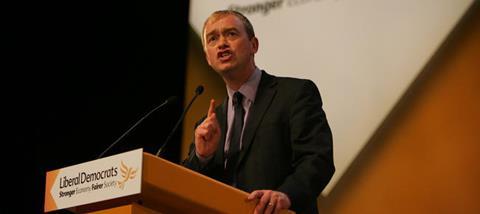
You've heard the story before: Someone gives voice to the traditional Christian view that homosexuality is wrong, modern culture will not tolerate that viewpoint and a witch-hunt starts against that person, indicative of society’s unfair oppression of Christian viewpoints in general. That's one explanation of what happened to Tim Farron last week.
But I disagree. Here's why:
Let’s rewind to Easter weekend, when the leaders of the main political parties each made an Easter statement. The set-piece I tire of is a Prime Minister asserting that Britain is a Christian nation and vaguely alluding to their own Christian faith as they head into a church service, followed by Christians uncritically lapping it up and congregations around the country saying from the pulpit or the evangelical open mic, "Thank God that we are a Christian nation with a Christian leader".
I'm glad I was away for Easter day, for fear of similar sentiments being expressed from the front of my congregation.
This year, however, proved to be different. May flashed her vicar’s daughter credentials and said "there is a sense that people are coming together" in what might as well have been Another Country because it was not recognisably ours.
Corbyn accurately, though passively, placed "social justice, peace and reconciliation" at the "heart of Christianity", "remembering Jesus’s example of love and sacrifice, and the Easter message of redemption and peace", yet Farron shared the Gospel directly. Packaged in a politically-motivated dig against nationalism and an exhortation of European co-operation and internationalism, he nonetheless said "Jesus died for you no matter who you are or where you are from", "But it wasn’t the end of the story. The resurrection means that this death wasn’t in vain – it’s the ultimate vindication which brings forgiveness. That’s worth celebrating."
Spiritual backlash
This is the thing one cannot just come out and say in the secular public sphere without a backlash. The love that dare not speak its name. The backlash is spiritual. Satan, the devil, the enemy, Screwtape – however you like to imagine spiritual opposition to Jesus’ ongoing reconciliation of men and women to God and to each other – mobilised an attempt to discredit the speaker.
Last week it manifested itself as dissection of Farron’s views on sexuality in the context of his faith. To carp on within the Church about what Tim did and didn’t say about homosexuality is to play right into the set-piece of the deceiver.
Arguments about same-sex marriage within the Church and about homosexuality itself are a side-show, detracting time and energy away from the real work of loving people.
Our enemy succeeds when we turn on one another, alienating people already in the faith and excluding people who would be interested in joining. We show a bigoted face to the world instead of Christ’s face.
We do need to discuss and explore the issue, but there is an overdue need for Christian leaders and commentators at all levels to make clear that this is not a central theological debate or an urgent cause to mobilise the faithful. We face a far bigger culture clash just going about our daily business of loving our neighbour in this increasingly insular society.
When we focus on the important work of service; meeting people’s needs without judgement, I think we’ll be transformed into a body more able to discern the right understanding of sexuality. Whatever our politics, whatever our stance on sexuality, we can learn from Tim Farron’s tactics of keeping on-message: Christ died, and rose again, so that everyone can be reconciled through his love.
Ruth Smith is a science teacher in Oxfordshire. She is married, with two young children and a member of a local community church
Click here to request a free copy of Premier Christianity magazine





























